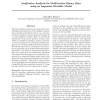Free Online Productivity Tools
i2Speak
i2Symbol
i2OCR
iTex2Img
iWeb2Print
iWeb2Shot
i2Type
iPdf2Split
iPdf2Merge
i2Bopomofo
i2Arabic
i2Style
i2Image
i2PDF
iLatex2Rtf
Sci2ools
115
click to vote
ISIPTA
1999
IEEE
1999
IEEE
Implicative Analysis for Multivariate Binary Data using an Imprecise Dirichlet Model
Bayesian implicative analysis was proposed for summarizing the association in a 22 contingency table in terms possibly asymmetrical such as, e.g., presence of feature a implies, in general, presence of feature b" a quasi-implies b" in short. Here, we consider the multivariate version of this problem: having n units which are classi ed according to q binary questions, we want to summarize the association between questions in terms of quasi-implications between features. We will rst show how at a descriptive level the notion of implication can be weakened into that of quasiimplication. The inductive step assumes that the n units are a sample from a 2q-multinomial population. Uncertainty about the patterns' true frequencies is expressed by an imprecise Dirichlet model which yields upper and lower posterior probabilities for any quasiimplicative statement. This model is shown to have several advantages over the Bayesian models based on a single Dirichlet prior, especially w...
Bayesian Implicative Analysis | Imprecise Dirichlet Model | ISIPTA 1999 | Lower Posterior Probabilities | Mathematics |
Related Content
| Added | 04 Aug 2010 |
| Updated | 04 Aug 2010 |
| Type | Conference |
| Year | 1999 |
| Where | ISIPTA |
| Authors | Jean-Marc Bernard |
Comments (0)

